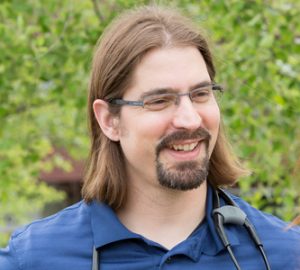Why communities need more primary care physicians

When Zachary Baeseman entered medical school, he planned to become an academic researcher. His goals were to earn a medical degree and a doctorate in molecular research.
And then, his plans completely changed.
“As I began my medical rotations, I found I enjoyed many things about various specialties,” he explained. “Coming from a small town in Northwest Wisconsin, I put family doctors on a pedestal, having seen how they bring so much value to a community. To be able to augment the quality of life for all residents in a community seemed like a great fit for me.”
Baeseman, MD, MPH, FAAFP, is now the associate medical director at ThedaCare Physicians Family Medicine with Operative Obstetrics at ThedaCare Physicians-Wild Rose and Waupaca. He is also an instructor for medical residents.
He stresses the importance of rural health.
“There is evidence that the more primary care physicians a location has per capita, the better that population’s health will be. Access to primary care is vital to every community’s health,” he said. “Although the career is rewarding, rural primary care has some obstacles, including recruiting and retaining healthcare providers.”
He noted that the Wisconsin Council on Medical Education and Workforce is projecting a shortfall of nearly 1,000 primary care physicians in Wisconsin in the next decade.
“That’s not an insignificant number,” he observed. “Being a rural family doctor is a challenging career, especially in a solo or small practice. There is a lot you have to potentially handle – from delivering babies to complex chronic disease management and serving people with health challenges. It takes a certain kind of person who has a growth mindset, is focused and enjoys challenges. They need to enjoy working with people and have a great personality to be a match for rural family practice medicine.”
Baeseman also explained the importance of access to care.
“That trusting patient/doctor relationship can be therapeutic in itself,” he said. “Often times, rural areas have a wide range of economic groups. For some, getting transportation to their appointments and paying for their medications can be challenging. Having a trusted person the patient can talk with about those stresses and perhaps troubleshoot through some of those barriers improves health.”
Primary care provider
Baeseman said it is significant to have a primary care provider who can follow through and advocate for patients, especially for people who have complex needs. Continuity of care can be vital.
“A primary care provider follows through with his/her patients, advocating for them with insurance, accessing health care systems and coordination with specialists,” he explained. “It’s beneficial that doctors use the same record-keeping system, seeing one another’s diagnoses and notes. Having a primary care provider with a bird’s eye view of all your health conditions can improve your health plan.”
Baeseman also said he enjoys being part of his community, where he feels connected.
“When you’re treating everyone in town, you’re in a good position to help move the dial forward where the health and wellness of the community are concerned,” he said. “It’s about making the community a better place for all.”
Baeseman feels with the expected upcoming shortage of primary care providers, there is opportunity. He is active in the Wisconsin Academy of Physicians, the Wisconsin Office of Rural Health and the Wisconsin Health Cooperative. He suggests that expanding residency programs in rural areas is imperative.
“We need adequate, high-quality training opportunities for rural physicians,” he said. “When residents come to our environment and see how rewarding and wonderful a diverse and broad spectrum practice can be, it often tips them to want a piece of that action for their career.”
